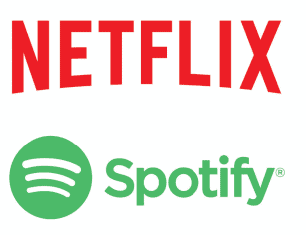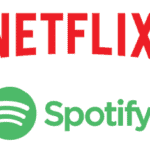While companies offering media streaming services aren’t included in the IRUK 500, they may offer vital clues as to how retail will develop
If they were to be included in IRUK 500, the subscription services Netflix (TV and films) and Spotify (music) would both be ranked in the Top150. As we’ve already noted, we haven’t included these companies because the services they provide are more analogous to pay TV than to retail ecommerce, the selling of goods and services.
Nonetheless, their strong presence – and music site Beatport and TV/movie site wuaki.tv also performed impressively – may have wider lessons for retail in terms of the sector beginning to employ elements of subscription-based services. Drawing on new research, we intend to cover this subject in more detail later in the year. In the meantime, it’s instructive to look briefly at how the music industry, one of the first sectors to grapple with issues around digital delivery and digital piracy too, continues to adapt to a changing market.
Here, the history of Apple is instructive. The company initially launched its iTunes store in April 2003. Five years later, iTunes became the largest music retailer in the US, a position it’s held ever since. By 2013, the store had sold 25 billion songs worldwide.
Yet Apple hasn’t had things all its own way. Not only does it face competition from other digital music retailers, but increasingly customers are accessing music via streaming services. Spotify was founded in 2006. By the summer of 2015, it had more than 75m active users, and 20m paying subscribers, who pay a monthly fee to listen to better-quality audio and without commercial radio-style advertisements interrupting the stream, and to be able to download music for offline listening when, for instance, using a mobile phone.
In 2015, Apple launched its own streaming service, Apple Music. According to a report in the Financial Times, the service took six months to reach 10 million subscribers, with many likely tempted in by a three-month free trial and the way the service is integrated with iTunes. From another angle, specialist store Rough Trade sells vinyl and offers a curated download service on a subscription basis.
While the music industry has been particularly buffeted by the rise of digital technologies, we strongly suspect other industries will increasingly adopt elements of a subscription model in retail offerings. The motor industry, for instance, effectively already does this with personal car lease deals. Or consider fashion services where customers initially see a stylist and are then sent clothes for consideration on a sale-or-return basis.
The wider point is that more traditional retailers need imagination and openness to new ideas in order to adapt to the challenges posed by such new business models. From the perspective of those of us compiling the IRUK 500, it also poses some problems: if Apple successfully extends its subscription model in the years ahead, at what point does the company cease to be a retailer as well as a technology company?
Giles Colborne of cxpartners discusses subscription services: etail.li/top500_subs_services






